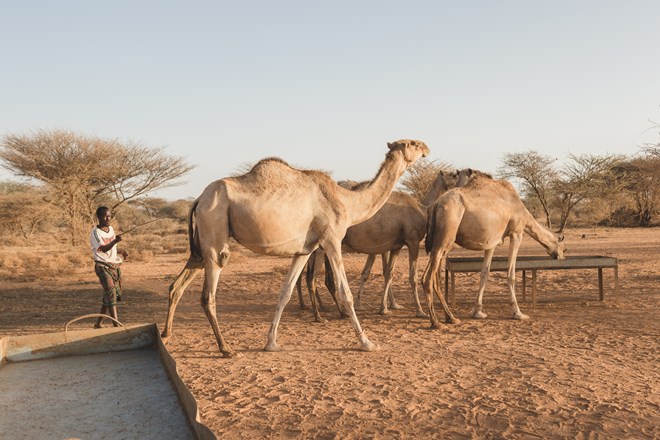
Saturday October 24, 2020
By Sarah Litchney

A pastoralist brings his camels to water.. Credit: iZone for Feed the Future
SEATTLE, Washington — The United Nations Development Programme (UNDP) and the Somali Government invested $10 million in an app that helps Somalis prepare for extreme weather changes occurring in their area. In recent years, Somalia has experienced rapid floods followed by droughts that have affected rural communities, especially Somali pastoralists. UNDP’s new app is the first of its kind in Sub-Saharan Africa and is aiding Somali pastoralists and citizens alike.
Somali Pastoralists and Weather Disasters
Pastoralists require the right amount of rain to create grazing areas for livestock. Beyond cattle, pastoralists do not have any other means of obtaining money. In Somalia, 60% of the population are pastoralists.
Water management is essential in Somalia because of multiple droughts in the area. From 2010 to 2012, 260,000 people died because of severe droughts in Somalia. Water shortage is also a significant challenge for Somali pastoralists, as well as Sub-Saharan African citizens.
The UNDP App: Aiding People Through Weather Disasters
UNDP’s new app works through the use of satellites and weather stations. Once an extreme weather change is detected, mobile phones receive an alert about any dangers in the area. Despite the difficulty of obtaining mobile phones in Sub-Saharan Africa, a 2013 survey by Gallup and a U.S. federal agency, called the Broadcasting Board of Directors, concluded that seven out of 10 Somalis owned a cellular phone.
Since phone coverage in Somalia is fairly vast, it is far easier to get important information to people through mobile apps. Moreover, approximately 50% of Somali pastoralists use cellular phones. As such, these essential alerts can quickly be sent to communities most affected by weather changes and its dangers.
The app will also inform the pastoralists of immediate water sources during droughts.
The App’s Effectiveness in Somalia
Since some pastoralists do not have cellular phones, it can be difficult to warn them of weather conditions. Most of Somalia’s cellular services are centered in urban areas. As such, tracking pastoralists based on their nomadic lifestyle is a complicated task.
However, UNDP’s initiative also provides pastoralists with essential skills, such as creating reservoirs to save water and assembling better tracking systems to look for extreme weather changes. Through gradual progress, UNDP and the Somali Government’s efforts led to fewer deaths in 2019. According to the government, the U.N. division’s efforts helped approximately 360,000 farmers and pastoralists.
The Effects of Droughts and Extreme Weather Conditions
If pastoralists cannot produce food from their cattle, it can persuade younger pastoralists to join terrorist organizations to meet basic necessities, such as shelter, food and water. Al-Shabaab, a militaristic terrorist group, has a large presence in Somalia because of poverty in rural areas. According to the 2012 Somalia Human Development Report, approximately 81% of Somalis live in poverty.
The extreme weather conditions put Somalis at risk of taking part in terrorist activities due to a lack of resources and economic and food insecurity. Moreover, Somalia is not a significant contributor to carbon dioxide emissions, which influences extreme weather and climate events. Instead, the country is affected by the top global carbon dioxide contributors, including the United States, China, and India.
The socio-economic conditions in Somalia may worsen if extreme weather changes continue in the area. This is a significant problem for Somalia’s economy and Somalis’ quality of life, as 75% of Somalis rely on stable weather for their jobs. Only about 25% of people in Somalia live in urban centers. Since Somalis are mostly pastoralists or farmers, rain seasons are especially critical for producing food.
Looking Ahead
The issue of extreme weather events adds to Somalia’s ongoing civil unrest and its weak government system. However, the UNDP hopes that these new resources will help disadvantaged communities prepare for extreme weather changes and save cattle from floods or droughts. Somalis are already using the app on a trial run to figure out where to direct cattle in times of drought. Despite the prevalent digital divide, the trial run has shown that new technologies make it easier for nomadic people to find resources. The UNDP project will run for four years, providing rural communities with essential information and skills to better fight the extreme weather and climate changes.